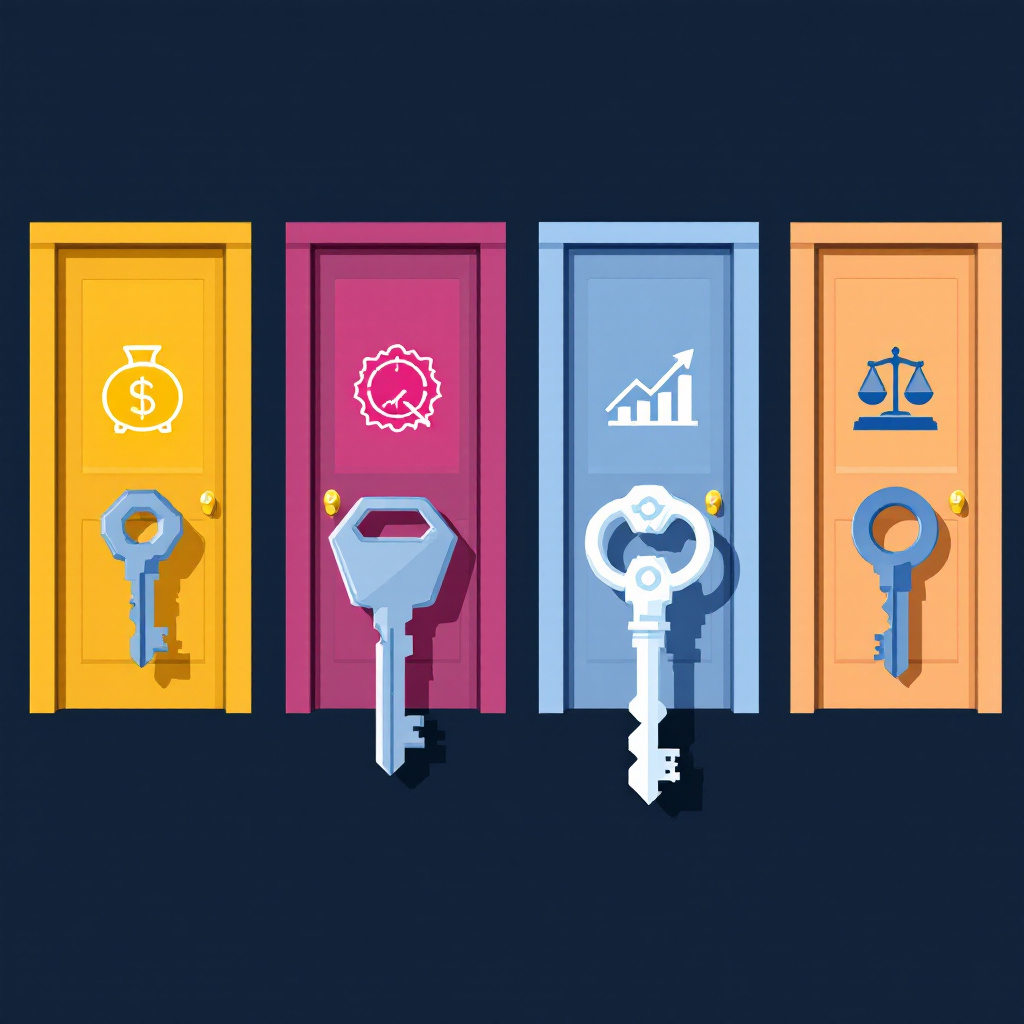The Many Benefits of Conventional Loans: A Deep Dive into Loan Advantages
When it comes to financing your dreams—whether it’s that cozy home you’ve been eyeing on Elm Street or an investment property to diversify your portfolio—there’s a cornucopia of loan options on the table. Amidst the cacophony of financial advice, conventional loans often stand out for their array of advantages tailored to meet diverse borrower needs. Ah, the fabled conventional loan! It’s time to delve into what makes it a darling in the mortgage world and how it stacks up in the wide landscape of loan options.
What Exactly Are Conventional Loans?
Before we jump into the nitty-gritty of loan advantages, let’s set the scene with a clear understanding of what conventional loans entail. Essentially, conventional loans are mortgages that aren’t backed by a government entity like the FHA or VA. They’re offered by private lenders such as banks, credit unions, and mortgage companies, making them highly versatile due to the absence of government strings attached.
Now, while they may sound like just another pair of khaki trousers in the world of finance, these loans come with a suit of bespoke benefits, well-suited to meet a variety of needs. Ready to learn how they can lead to your financial bliss? Buckle up.

Attractive Interest Rates: A Key Loan Advantage
Let’s face it, nobody wants to pay more in interest than they absolutely have to. With conventional loans, borrowers with stellar credit often find themselves in the sweet spot with highly competitive interest rates. Why?
- Market Competitiveness: Lenders vie for top-notch borrowers by offering lower rates to secure their business. This essentially opens the door for resourceful borrowers to nab a pretty nifty rate.
- Fixed or Adjustable Rates: Depending on your financial goals and tolerance for risk, conventional loans offer you the flexibility to choose between a fixed-rate mortgage, which guarantees the same rate for the life of the loan, or an adjustable-rate mortgage (ARM), where the rate may fluctuate based on the market. Take your pick!
The better your credit score and down payment, the more likely you are to walk away with a rate that’ll make you grin from ear to ear.
Flexibility Galore: Customize Your Loan to Fit Your Needs
Conventional loans aren’t just one-size-fits-all; think of them more like a custom-fit suit, tailormade to your financial figure. The flexibility inherent in these loans is one of the quintessential loan advantages that keep buyers returning.
For one, the terms are incredibly adaptable. Whether you’re looking to borrow for 10 years or 30 years, the choice is typically yours, meaning you can align your loan term with your financial ambitions or expected income trajectory. Not many say no to options, right?
Moreover, down payment requirements can be finagled based on the lender and your financial stand. Unlike FHA loans, which have a set minimum down payment requirement, conventional loans can offer more elasticity here. Have a substantial down payment? You might even forego private mortgage insurance (PMI), bringing your costs down—and everyone’s a fan of saving a few bucks.
Higher Loan Limits: More Money, Fewer Problems
Ever heard the saying “Go big or go home”? Well, conventional loans unequivocally support that mantra. With higher loan limits than many government-backed loans, borrowers can access a larger quantum of funds. This is particularly advantageous if you’re eyeing property in high-cost areas.
Also, with conventional mortgages, you’re often given the flexibility to step outside the conforming loan limits if you so choose, opting for what’s known as a jumbo loan. Go on, dream big!
No Upfront Funding Fees: More Cash in Your Pocket
In a world where nearly every service comes with a fee—and often another fee lurking behind it—having loan options that won’t nickel and dime you upfront is worth its weight in gold. With conventional loans, there are no mandatory upfront funding fees, setting them apart from many government-backed options.
Avoiding these fees means you get to allocate your funds toward other meaningful ventures or stash them away for a rainy day. It’s all about crafting a financial narrative that preludes prosperity.
Home Equity: Build It Faster
Conventional loans often come with shorter loan terms compared to alternatives, enabling borrowers to build equity faster. What’s equity, you ask? Simply put, it’s the portion of your home that you actually own, wedged between the value of the property and the amount you owe on your mortgage.
Building equity can be a springboard to financial nirvana. Whether you’re eyeing home improvements or diversifying into other investments, being equity-rich offers ample leverage.
Simplicity and Control: Navigate on Your Terms
Another noteworthy aspect leading the troupe of loan advantages is the simplicity and control that conventional loans offer. Unlike FHA loans, there’s no need to jump through the regulatory hoops and hurdles associated with government-backed options.
Borrowers can negotiate turnarounds, loan disclosures, and approvals more straightforwardly. It’s akin to driving a car yourself rather than being a passenger. You’re in control, setting your pace and direction without a bureaucratic backseat driver.
Additional Considerations: Keeping Eyes Wide Open
While the many loan advantages of conventional loans may seem tantalizing, a savvy borrower knows the full symphony requires the whole orchestra—not just the chorus of benefits. It’s worth noting that while conventional loans offer great perks, they also demand more rigorous credit and income qualifications. This might leave some potential borrowers feeling like they’re caught between a rock and a hard place.
Nonetheless, if you tick the boxes on creditworthiness, income, and required down payment, you’ll discover that conventional loans are like a good old-fashioned bicycle: reliable, efficient, and built to help you reach your destination.
Conclusion: Plotting Your Path with Loan Advantages
Whether you’re a first-timer stepping into the housing market or a seasoned pro looking to expand an investment portfolio, understanding the myriad loan advantages that conventional loans bring can be a beacon guiding you home.
The allure of competitive interest rates, extensive flexibility, higher loan limits, and faster equity building are just a few highlights on this financial adventure. So, when life gives you a set of keys to unlock lending possibilities, know that conventional loans have a treasury of benefits ready to help you navigate—not just survive—in the complex world of home financing.
So go on, forge ahead with knowledge, confidence, and an eye toward the horizons of your dreams. Because there’s no place like the home that fits your dreams, budget, and timeline all in one neat package!
FAQs
What is a benefit of a conventional loan?
Conventional loans come with a suite of benefits, particularly for those with solid credit and stable income. Borrowers can take advantage of flexibility in loan terms and lower interest rates compared to more restrictive government-backed options like FHA loans. Additionally, if you can manage a larger down payment, you might bypass the need for private mortgage insurance (PMI), which can significantly reduce your monthly payments.
What are the loan advantages and disadvantages associated with conventional loans?
One major advantage of conventional loans is cost-effectiveness; they typically offer lower interest rates and fees, providing a more economical option compared to loan types like personal loans or credit cards. However, on the flip side, conventional loans have strict eligibility criteria, including higher credit score and income requirements, which can be a barrier for some borrowers. It’s all about weighing the cost benefits versus the eligibility hurdles.
What are the advantages and disadvantages of a fixed-rate conventional loan?
Opting for a fixed-rate conventional loan means you’re locking in a consistent interest rate over the life of the loan, which provides predictability and stability in budgeting your finances. However, the disadvantage surfaces when market interest rates decline, as you won’t benefit from lower rates unless you refinance, which often incurs exit or break fees. It’s a balancing act between financial stability and potential cost savings.
How do conventional loans compare to government-backed loans?
Conventional loans usually offer more customization in terms and often don’t require upfront fees like government-backed loans (think FHA or VA loans) might. They can be a more viable option for borrowers with higher credit scores who can afford larger down payments. Conversely, government-backed loans may be a better option for those needing lower down payment requirements or whose credit scores aren’t top-tier.

